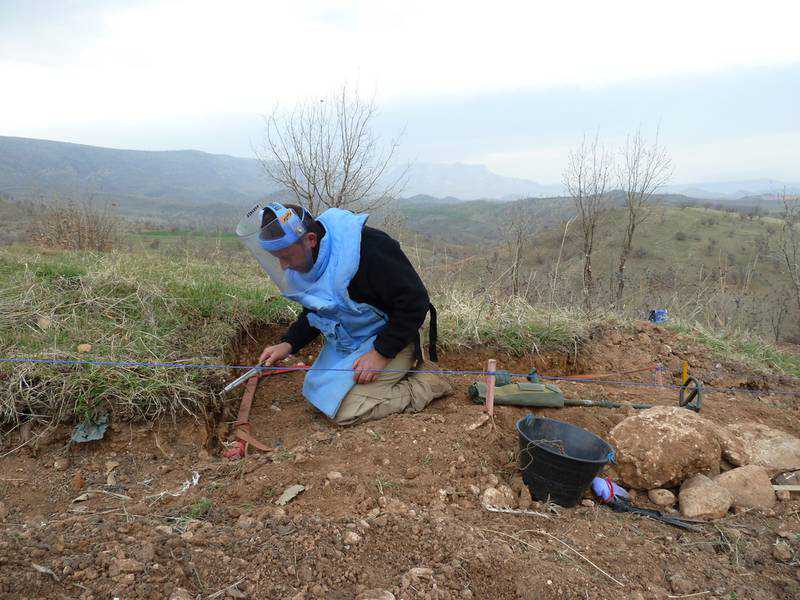Can a cheap AI rover save thousands of lives at risk from landmines?
23 September, 2021

In 59 countries, leftover weapons of war continue to maim and kill civilians decades after a conflict has passed.
An international team at Abu Dhabi’s Technology Innovation Institute (TII) is working to change that, now entering the final phase of testing a cheap, easy-to-assemble rover that can detect unexploded landmines.
The autonomous rover is the product of 15 years of work that began in Colombia, when four young research scientists decided to tackle the issue of injury and death as a result of unexploded landmines in their home country. Felix Vega, John Pantoja and Nicolas Mora, led by Francisco Roman, worked for years developing radars capable of detecting buried objects in the ground. Over time, the work attracted engineers from Germany, Sweden and Switzerland as well.
“This is more of a human story than a technical story,” Dr Chaouki Kasmi, chief researcher at the Directed Energy Research Centre of TII, told The National.
The mission of the research centre in the UAE capital is to identify existing and future problems that stymie traditional research teams, either due to lack of interest, funding or a practical solution, among other challenges. Once such a project is identified then the race is on to get from early prototype to a demonstrator ready to leave the laboratories and gain industry uptake.
In recent years, there has been a sharp increase in the number of civilian casualties from landmines, an explosive device that is buried or placed hidden on the ground that is often “victim activated”, according to Belgian NGO Apopo.
On average globally someone is injured or killed by mines — including improvised mines — and by explosive remnants of war every 90 minutes. The vast majority of these casualties are civilians, and nearly half are children, according to the Establishment of the Explosive Ordnance Risk Education Advisory Group (EORE AG). The group found that refugees and returnees from conflict are also particularly vulnerable to risks from explosive ordnance.
Landmines also have a dampening effect on economic recovery in war-damaged areas. Villages are cut off from basic necessities such as water supplies and essential travel routes, and are prevented from using fertile land for the cultivation of crops, grazing livestock or development, according to Apopo.
Dr Kasmi saw potential in the team from Colombia, who he was acquainted with from going to the same conferences over the years.
“The goal was to bring people with really good skills, a fresh perspective on R&D and applied research and who are looking at solving problems in a new way,” he said. “I proposed they come and innovate in Abu Dhabi.”
The team sourced most of the materials for the rover from Mussafah, an industrial supplies zone in the UAE capital. The goal was to build a vehicle with a computer on board that can run the detection software, with cheap and widely available materials. In doing so, the team hopes to make the technology available to as many countries as possible, even providing the schematic for the rover and the software to run it for free if necessary.
“Our goal was to say, if tomorrow someone needs to build it, they need to build it as fast as possible with minimum funds and maximum availability of the material,” Dr Kasmi said.
In September, the system proved to be operational, successfully detecting real threats from random metal objects. Now, the team is looking for corporate, NGO and government partners to expand its testing environment so that the machine learning component can take in more data and improve its accuracy.
Today, the most common accepted standard is human-operated metal detectors for humanitarian demining operations. Regulations will need to change country-by-country in order for the rover to be useful.
Still, TII is aiming to have the system operational in countries where it is needed by 2022.
“Our success is to see the system on the ground.” Dr Kasmi said, adding that he is well aware of the stakes. “If you tell someone they can go back [to their home], then the ground better be clear.”
Source: www.thenationalnews.com
TAG(s):
